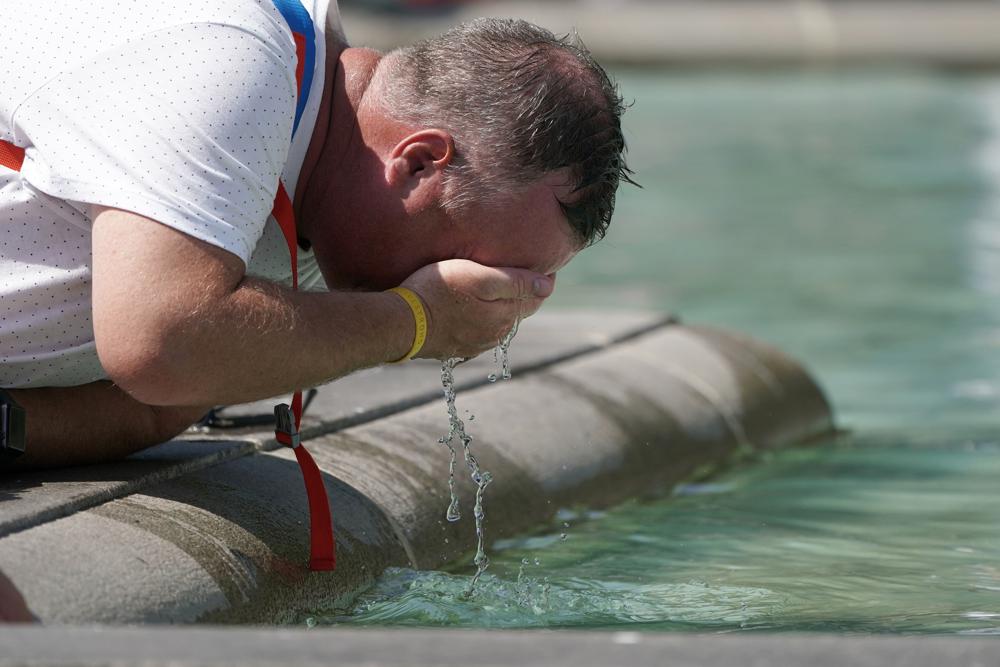According to AP, Britain shattered its record for highest temperature ever registered Tuesday amid a heat wave that has seared swaths of Europe — and the national weather forecaster predicted it would get hotter still in a country ill prepared for such extremes.
The typically temperate nation was just the latest to be walloped by unusually hot, dry weather that has triggered wildfires from Portugal to the Balkans and led to hundreds of heat-related deaths. Images of flames racing toward a French beach and Britons sweltering — even at the seaside — have driven home concerns about climate change.
The U.K. Met Office registered a provisional reading of 40.2 degrees Celsius (104.4 degrees Fahrenheit) at Heathrow Airport in early afternoon — breaking the record set just an hour earlier and with hours of intense sunshine still to go. Before Tuesday, the highest temperature recorded in Britain was 38.7 C (101.7 F), set in 2019.
A smaller third fire broke out late Monday in the Medoc wine region north of Bordeaux, further taxing firefighting resources. Five camping sites went up in flames in the Atlantic coast beach zone where blazes raged around the Arcachon maritime basin famous for its oysters and resorts.
But weather forecasts offered some consolation, with temperatures expected to ease along the Atlantic seaboard Tuesday and the possibility of rains rolling in late in the day.
Britain was not the only northern European country experiencing unusual heat. As Amsterdam baked Tuesday, municipal workers sprayed water on some mechanical bridges over the Dutch city’s canals to prevent metal in them from expanding, which can jam them shut blocking boat traffic. Temperatures in the city are expected to approach 39 C (102 F) on Tuesday.
As the nation watched the mercury rise with a combination of horror and fascination, the forecaster warned temperatures could go higher still.
The sweltering weather has disrupted travel, health care and schools in a country not prepared for such extremes. Many homes, small businesses and even public buildings, including hospitals, don’t even have air conditioning, a reflection of how unusual such heat is in the country better known for rain and mild temperatures.
The intense heat since Monday has damaged the runway at London’s Luton Airport, forcing it to shut for several hours, and warped a main road in eastern England, leaving it looking like a “skatepark,” police said. Major train stations were shut or near-empty on Tuesday, as trains were canceled or ran at low speeds out of concern rails could buckle.
London Mayor Sadiq Khan said Tuesday that the heat wave has caused a “huge surge” in the number of fires in the city, putting the fire service under “immense pressure.” The blazes include a grass fire in Wennington on the eastern edge of the city that is being tackled by 100 firefighters.
Electric fans cooled the traditional mounted troops of the Household Cavalry as they stood guard in central London in heavy ceremonial uniforms. Other guards reduced their duties. The capital’s Hyde Park, normally busy with walkers, was eerily quiet — except for the long lines to take a dip in the Serpentine lake.
“I’m going to my office because it is nice and cool,” said geologist Tom Elliott, 31, after taking a swim. “I’m cycling around instead of taking the Tube.’’
Queen Elizabeth II carried on working. The 96-year-old monarch held a virtual audience with new U.S. ambassador Jane Hartley from the safety of inside Windsor Castle.
A huge chunk of England, from London in the south to Manchester and Leeds in the north, remained under the country’s first “red” warning for extreme heat Tuesday, meaning there is danger of death even for healthy people.
Such dangers could be seen in Britain and around Europe. At least six people were reported to have drowned across the U.K. in rivers, lakes and reservoirs while trying to cool off. Meanwhile, nearly 750 heat-related deaths have been reported in Spain and neighboring Portugal in the heat wave there.
The highest temperature previously recorded in Britain was 38.7 C (101.7 F), a record set in 2019. Tuesday’s reading was provisional, which means they are produced as near to real time as possible with final readings issued after data quality-control, the Met Office said.
Climate experts warn that global warming has increased the frequency of extreme weather events, with studies showing that the likelihood of temperatures in the U.K. reaching 40 C (104 F) is now 10 times higher than in the pre-industrial era.
The head of the U.N. weather agency expressed hope that the heat gripping Europe would serve as a “wake-up call” for governments to do more on climate change.
“I hope that also in democratic countries, these kind of events will have an impact on voting behavior,” World Meteorological Organization Secretary-General Petteri Taalas told reporters Tuesday in Geneva.
Combatting climate change head on is the only solution for Britain, said Professor Myles Allen, a climate scientist at the University of Oxford, because continually refurbishing the country’s infrastructure to cope will be “extremely expensive.”
“We cannot afford to live in an ever-changing climate,” he told the BBC. “We have to stop this, turn this around.”
Drought and heat waves tied to climate change have also made wildfires harder to fight.
In the Gironde region of southwestern France, ferocious wildfires continued to spread through tinder-dry pines forests, frustrating firefighting efforts by more than 2,000 firefighters and water-bombing planes.
Tens of thousands of people have been evacuated from homes and summer vacation spots since the fires broke out July 12, Gironde authorities said.





















